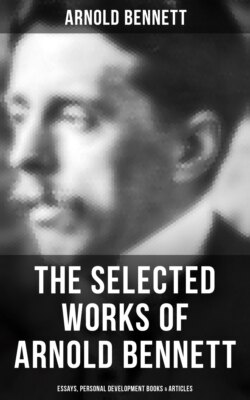Читать книгу The Selected Works of Arnold Bennett: Essays, Personal Development Books & Articles - Arnold Bennett - Страница 44
На сайте Литреса книга снята с продажи.
The Self-Education of the Aspirant.
ОглавлениеEvery aspirant should pursue the following course:—
He should learn to spell. Spelling is the first thing in the craft of literature. Most people imagine that they can spell correctly; but the simple accomplishment is extremely rare. You who read this imagine that you can spell correctly. But hand a dictionary to a friend and ask him to test you in common words, and the chances are that you will be undeceived in five minutes. It is a fact that not one person in ten can be relied on to spell quite ordinary words correctly, and I do not believe that writers are superior to their fellows in the matter of orthography. The aspirant should have ten minutes’ practice in spelling every day. Some vain and pig-headed aspirant, afraid of being mistaken for a schoolboy, will think that this counsel is ridiculous. It is not ridiculous, but intensely practical.
He should study the etymology of words. No writer who has not a sound acquaintance with the history of words can possibly make full use of his powers. A first-class dictionary is essential. There are several in the market. The best is, of course, the New English Dictionary. It is still far from completion, and its price is rather high; but it is worth its price to any writer. The Century Dictionary is perhaps the next best The writer should also have a small exclusively etymological dictionary. Skeat’s Concise Etymological Dictionary, published by the Clarendon Press, 5s. 6d., is the best; but Chambers' little Etymological Dictionary, 3s. 6d., is not to be despised. These dictionaries should be read daily. I have been told by one of our greatest living novelists, that he constantly reads the dictionary, and that in his youth he read the dictionary through several times. I may recount the anecdote of Buckle, the historian of civilisation, who, when a certain dictionary was mentioned in terms of praise, said: “Yes, it is one of the few dictionaries I have read through with pleasure.” Dictionaries should surely be interesting to him who is interested in words, and the first characteristic of the born writer is that he is interested in words.
But no dictionary can pretend to be exhaustive in its treatment of any word; it cannot, for instance, follow a word into its combinations with other words; and it must necessarily leave much to the deductive powers of the student. Therefore the aspirant must pursue his inquiries into words beyond the covers of dictionaries. He must study words in English literature itself. And in order to learn the method of such study, he should read a book like the late Archbishop Trench’s On the Study of Words, published by Messrs. Kegan Paul, and now approaching its thirtieth edition. In the light of recent etymological research, Trench is admittedly inaccurate, but the spirit and the method in and by which he approaches and grasps his subject are admirable. His enthusiasm is as infectious as a cold which runs through a household. A later, more elaborate, and more accurate book is Words and their Ways in English Speech, by two American professors, J. B. Greenhough and G. L. Kittredge, published by Messrs. Macmillan: a simply delightful volume, which it is the duty of every literary aspirant to read, and to read again. The intimacy with words which must infallibly result from such study as I here indicate, will have its immediate result in an improvement'—an increased vigour, picturesqueness, subtlety, and adroitness — of the aspirant’s style. And let the worldly-minded remember that these qualities of vigour, picturesqueness, subtlety, and adroitness, ultimately stand for pounds per thousand.
The aspirant should study English grammar, a subject seldom treated with any glimmering of sense in high-schools, but one which a board school teacher may be trusted to teach satisfactorily. It is obviously a truism that the man who does not understand the grammatical principles which underlie the construction of English sentences, cannot rely on his ability to construct a sentence correctly. Yet how few writers, especially women - writers, are capable of “parsing” and “analysing” the sentences which they so cheerfully put together! The two manuals which I recom. mend in this connection are Dr. Richard Morris’s Primer of English Grammar and Mr. John Wetherell’s Exercises on Morris's English Grammar (both published by Messrs. Macmillan at a shilling each). They can be thoroughly mastered in quite a short time, with or without the assistance of a teacher. Again I must warn the aspirant not to scorn these beginnings of the great art of literature. It is always to the profit of a craftsman to “know his business,” and the writer who cannot with ease and assurance “parse” and “analyse,” emphatically does not know his business.
